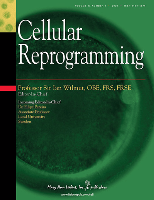
Cellular Reprogramming
Scope & Guideline
Empowering Discovery in Biochemistry and Genetics
Introduction
Aims and Scopes
- Cellular Reprogramming Techniques:
The journal covers various methodologies for inducing cellular reprogramming, including the use of transcription factors, small molecules, and gene editing technologies like CRISPR/Cas9. - Stem Cell Biology:
Research on different types of stem cells, including induced pluripotent stem cells (iPSCs) and mesenchymal stem cells, is a core focus, particularly their differentiation potential and applications in regenerative medicine. - Therapeutic Applications:
The journal emphasizes the clinical potential of cellular reprogramming in treating diseases, including cancer, neurodegenerative disorders, and age-related conditions. - Ethical Considerations:
Exploration of the ethical implications surrounding cellular reprogramming and stem cell research, ensuring responsible advancement in the field. - Interdisciplinary Collaborations:
The journal features interviews and discussions with leading researchers, fostering interdisciplinary collaboration across fields such as developmental biology, genetics, and regenerative medicine.
Trending and Emerging
- Aging and Cellular Rejuvenation:
There is a growing focus on the role of cellular reprogramming in reversing age-related changes and rejuvenating aged tissues, underlining its potential in regenerative medicine. - Gene Therapy and Editing Technologies:
Recent articles highlight the integration of gene therapy and advanced editing technologies, such as base editing and CRISPR, as critical components in enhancing reprogramming efficiency and safety. - Exosome and Extracellular Vesicle Research:
Emerging studies on the roles of exosomes and extracellular vesicles derived from stem cells are gaining traction, suggesting their potential in cell communication and regeneration. - Applications in Cancer Therapy:
The application of cellular reprogramming techniques in cancer therapy is increasingly discussed, particularly how reprogrammed cells can be utilized for targeted treatments. - Ethics and Public Policy:
There is an emerging discourse around the ethical implications and regulatory frameworks of cellular reprogramming, reflecting a growing awareness of the societal impacts of this research.
Declining or Waning
- Traditional Cloning Techniques:
Earlier articles emphasized cloning methodologies, but recent trends show a shift towards innovative reprogramming methods, indicating that traditional cloning may be waning in favor of more advanced techniques. - Basic Mechanistic Studies:
While foundational mechanistic studies were prevalent in earlier publications, there is a noticeable decline in purely theoretical discussions as the journal increasingly prioritizes practical applications and therapeutic advancements. - Limited Focus on Non-Mammalian Systems:
Research involving non-mammalian model organisms has decreased, with a stronger emphasis now on mammalian systems and human applications, suggesting a narrowing of the scope towards clinically relevant studies.
Similar Journals
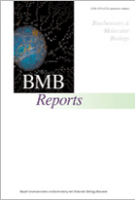
BMB Reports
Fostering Dialogue in Biochemical InnovationBMB Reports is a distinguished open-access journal published by the Korean Society of Biochemistry & Molecular Biology since 2008, making significant contributions to the fields of biochemistry, molecular biology, and medicine. With a current impact factor that positions it in the Q2 category for Biochemistry and Q1 for Miscellaneous Medicine, this journal supports a wide dissemination of high-quality research findings, fostering robust dialogue among researchers, professionals, and students alike. Based in Seoul, South Korea, BMB Reports aims to publish innovative studies that advance our understanding of biochemical and molecular processes, thus shaping the future of health and medicine. The journal's commitment to open access enhances the visibility of its articles, allowing for greater accessibility and engagement in the scientific community. With notable rankings in both the Biochemistry and Molecular Biology categories, BMB Reports stands as a vital resource for those seeking to stay at the forefront of research in these rapidly evolving disciplines.
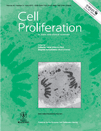
CELL PROLIFERATION
Empowering Global Collaboration in Cell BiologyCELL PROLIFERATION, published by Wiley, is a leading open-access journal that has been at the forefront of research since its inception in 1968. With an impact factor that solidifies its position in the Q1 category of both Cell Biology and Medicine (Miscellaneous), this journal serves as a premier platform for disseminating groundbreaking studies in the field of cellular and molecular biology. The journal is renowned for its rigorous peer-review process and comprehensive coverage of topics related to cell growth, division, and differentiation, making it an invaluable resource for researchers, professionals, and students alike. With its notable Scopus ranking of #30 in Biochemistry, Genetics, and Molecular Biology: Cell Biology, and a robust open access model since 2019, CELL PROLIFERATION ensures that cutting-edge research is accessible to a global audience, fostering collaboration and innovation across the scientific community. Located in the United Kingdom, the journal remains committed to enhancing the understanding of cellular processes, thereby influencing developments in medicine and biotechnology.

Stem Cells Translational Medicine
Transforming Discoveries into Clinical ApplicationsStem Cells Translational Medicine, published by Oxford University Press, is a leading open-access journal that has been at the forefront of stem cell research since its launch in 2012. With an impressive impact across various categories, it occupies Q2 in Cell Biology and is highly recognized in Q1 for both Developmental Biology and Miscellaneous Medicine in 2023. Its strong Scopus rankings highlight its significance in the fields of Biochemistry, Genetics, and Molecular Biology, achieving an outstanding percentile ranking of 93rd in Developmental Biology. The journal provides a pivotal platform for researchers, professionals, and students to publish and access cutting-edge findings that contribute to the understanding and application of stem cell technology. With a commitment to disseminating high-quality scientific knowledge, Stem Cells Translational Medicine plays a vital role in advancing research and innovation within the rapidly evolving landscape of regenerative medicine.

EXPERIMENTAL CELL RESEARCH
Illuminating the Complexities of Cellular LifeEXPERIMENTAL CELL RESEARCH is a highly respected journal published by Elsevier Inc, specializing in the dynamic and ever-evolving field of Cell Biology. With an impact factor positioned in the Q2 quartile for 2023, it ranks at the 124th position out of 285 in the Scopus Ranks, indicating a solid reputation among peers in the domains of biochemistry, genetics, and molecular biology. Since its inception in 1950, the journal has contributed significantly to the dissemination of groundbreaking research, providing a platform for studies that explore the nuances of cellular mechanisms, processes, and experimental methodologies. Although the journal currently does not offer open access, its commitment to high-quality, peer-reviewed research continues to attract submissions from leading scientists and scholars across the globe. Researchers, professionals, and students alike will find this journal an invaluable resource for keeping abreast of current developments and innovative breakthroughs in cellular science.

Stem Cells and Cloning-Advances and Applications
Exploring the Future of Cellular BiologyStem Cells and Cloning-Advances and Applications is a leading peer-reviewed journal dedicated to the dynamic fields of stem cell research and cloning technologies. Published by DOVE MEDICAL PRESS LTD in New Zealand since 2008, this Open Access journal ensures that groundbreaking findings are accessible to a global audience. With a focus on innovative applications and advancements in cellular biology, the journal plays a pivotal role in disseminating knowledge within the scientific community. The journal currently holds an impact factor that reflects its influence, with notable rankings in both Cell Biology and Medicine (Miscellaneous), showcasing its interdisciplinary relevance. Researchers, professionals, and students alike benefit from the journal’s wide-ranging contributions, covering critical topics from regenerative medicine to genetic research. With a commitment to fostering collaboration and encouraging discussion in these cutting-edge domains, Stem Cells and Cloning-Advances and Applications continues to be a vital resource for advancing scientific inquiry and application.
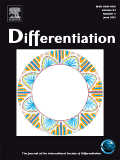
DIFFERENTIATION
Exploring the Complexities of Life's Building BlocksDIFFERENTIATION is a respected peer-reviewed journal published by Elsevier Science Ltd, dedicated to advancing knowledge in the fields of Cancer Research, Cell Biology, Developmental Biology, and Molecular Biology. With an established history since 1973, the journal continuously explores the intricacies of cellular and molecular processes that govern differentiation in biological systems, thus playing a pivotal role in shaping contemporary research directions. Currently indexed in the Q3 quartile across multiple relevant categories, it provides a crucial platform for researchers to disseminate their findings and engage with the scientific community. DIFFERENTIATION does not offer open access, but it remains a valuable resource for academics seeking to enhance their understanding of the fundamental mechanisms that underpin life sciences. By fostering a rigorous dialogue among scientists, it contributes significantly to the ever-evolving landscape of biochemistry and genetics.
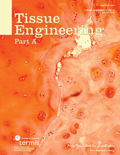
Tissue Engineering Part A
Empowering Scientists to Redefine Regenerative MedicineTissue Engineering Part A is a prestigious peer-reviewed journal published by MARY ANN LIEBERT, INC that focuses on innovative research and advancements within the field of tissue engineering and regenerative medicine. Since its inception in 2008, this journal has played a critical role in disseminating cutting-edge findings that bridge the gap between laboratory research and clinical application, underscoring its significance in the scientific community. With a diverse scope encompassing biochemistry, bioengineering, biomaterials, and biomedical engineering, the journal ranks notably in the Scopus database, holding a Q2 quartile status across multiple categories, thus reflecting its high impact on ongoing research and professional practice. For researchers, professionals, and students, Tissue Engineering Part A serves as an invaluable resource, offering insights into the latest methodologies and breakthroughs that drive the future of healthcare and therapeutic strategies. While primarily a subscription-based journal, it ensures that vital research is accessible to a broad audience of scientists and engineers committed to advancing the life sciences.

Cells, published by MDPI in Switzerland, is a leading open-access journal that has been disseminating groundbreaking research in the fields of Biochemistry, Genetics, and Molecular Biology since its inception in 2011. With an impressive E-ISSN of 2073-4409, the journal boasts a strong impact factor and ranks in the 84th percentile for Scopus ratings, underscoring its significance in advancing scientific knowledge. As a Q1-ranked journal in both 2023 and 2020, it serves as a premier platform for researchers, professionals, and students eager to explore innovative findings and methodologies. By providing unrestricted access to high-quality research, Cells plays a pivotal role in facilitating collaboration and inspiration within the global scientific community, making it an indispensable resource for anyone interested in cutting-edge discoveries in cellular biology.

CELL BIOLOGY INTERNATIONAL
Shaping the Future of Cell Biology and MedicineCELL BIOLOGY INTERNATIONAL is a prestigious academic journal dedicated to the rapidly evolving field of cell biology, publishing high-quality research aimed at understanding cellular processes and their implications in various biological contexts. Published by Wiley, this journal has established its relevance with an H-Index that reflects its robust citation impact and a commendable Scopus Rank of #111 out of 285 in the field of Biochemistry, Genetics, and Molecular Biology, positioning it in the 61st percentile. Although it operates under a traditional subscription model, its influential insights are crucial for researchers, professionals, and students alike who are seeking cutting-edge developments in cellular mechanisms and their applications in medicine. The journal spans contributions dating back to 1993, providing a rich archive of knowledge that continues to shape the discourse within the scientific community. With a strong category ranking of Q3 in Cell Biology and Q2 in Medicine (miscellaneous) as of 2023, CELL BIOLOGY INTERNATIONAL stands as a reliable platform for disseminating transformative science in the cellular domain.
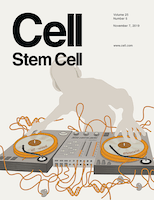
Cell Stem Cell
Transforming Knowledge into Innovation in Stem Cell ScienceCell Stem Cell, published by CELL PRESS, is a premier journal at the forefront of cellular biology, genetics, and molecular medicine. With an esteemed impact factor and recognized as a Q1 journal in multiple categories including Cell Biology, Genetics, and Molecular Medicine, it offers researchers, professionals, and students rigorous, peer-reviewed articles that shape the future of stem cell research and regenerative medicine. Located in Cambridge, MA, this journal has become an invaluable resource since its inception in 2007 and is committed to disseminating groundbreaking findings that drive innovation and understanding in these critical fields. By consistently ranking within the top percentile of its categories in Scopus, Cell Stem Cell remains an essential platform for scholarly communication, fostering collaboration among leading scientists worldwide. Although the journal does not currently offer open access options, its comprehensive insights are pivotal for anyone engaged in the study of stem cells and their applications.